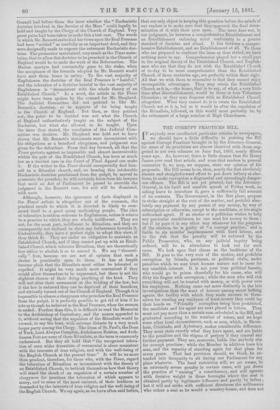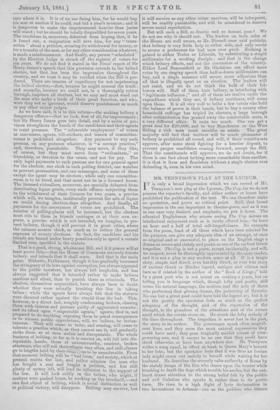THE CORRUPT PRACTICES BILL.
IT anybody ever recollected particular articles in newspapers, we should have a little difficulty in praising the Bill against Corrupt Practices brought in by the Attorney-General, for some of its provisions are almost identical with those sug- gested in our own columns on June 2nd, 186G, nearly fifteen years ago. As, however, there is little chance that Sir Henry James ever read that article, and none that readers in general remember it, we may, we suppose, state our opinion of his proposals. His Bill seems to us, then, nearly the first absolutely sincere and straightforward effort to put down bribery at elec- tions, to make corruption a disgraceful and exceedingly danger- ous offence. The Bill is not yet printed, but the Attorney- General, in his lucid and sensible speech of Friday week, on asking leave to introduce it, gave a sufficiently full account of its contents. The Government, in the first place, propose to strike straight at the root of the matter, and prohibit abso- lutely any payment by any person of any money, by way of subscription or otherwise, except to the candidate, or his single authorised agent. If an elector or a politician wishes to help any particular candidature, he can send his money to them ; but if he pays it in any other way whatever for the purposes of the election, he is guilty of " a corrupt practice," and is liable to six months' imprisonment with hard labour, and to the risk that the penalty will be enforced by the Public Prosecutor, who, on any judicial inquiry being ordered, will be in attendance to look out for such cases. We look upon that clause as the backbone of the Bill. It goes to the very root of the matter, and prohibits corruption by friends, partisans, or political clubs, under penalties which we may trust human nature not to incur for any unselfish interest. It is not your true political fanatic, who would go to prison cheerfully for his cause, who will dirty his fingers with corruption ; while the man who will risk everything will not be trusted with money, or with power over his employers. Nothing came out more distinctly in the late investigations than the want of honour among secret bribing agents, the facility with which they made excuses to them- selves for stealing any residuum of trust-money they could lay their hands on. "Friendly " corruption being thus prohibited, the candidate and his agent are next placed in fetters. They must not pay more than a certain sum, scheduled in the Bill, and graduated according to the number of voters, and we hope some other local circumstances, such as area, which, in Shore- ham, Cricklade, and Aylesbury, makes considerable difference. They must state exactly what they have spent, and are liable to the penalties and the stigma of perjury if they conceal any further payment. They are, moreover, liable like anybody else for corrupt practices ; while the Member in addition loses his seat, and the capacity of standing again for that plane for seven years. That last provision should, we think, be ex- tended into incapacity to sit during one Parliament for any place whatever. The local restriction will, we are aware, be an extremely severe penalty in certain cases, will put down the practice of " nursing" a constituency, and will operate with decisive weight in those boroughs where the seat is obtained partly by legitimate influence and partly by bribes ; but it will not strike with sufficient directness the millionaire who orders a seat as he would a country-house, and does not
care where it is. It is of no use fining him, for he would buy his seat at auction if he could, and bid a year's revenue ; and it is dangerous to make the imprisonment heavier than juries will stand ; but he should be totally disqualified for seven years. The candidate is, moreover, debarred from hoping that, if he is found out, a resignation will save him, for any " trans- action " about a petition, securing its withdrawal for money, or for a transfer of the seat, or for any other consideration whatever, is made a misdemeanour. And finally, any person " scheduled by the Election Judge is struck off the register of voters for ten years. We do not find it stated in the Times' report of Sir Henry James's speech that this provision extends to the bribed elector, but that has been the impression throughout the country, and we trust it may be verified when the Bill is pro- duced. There are reasons of expediency for not imprisoning the bribed elector,—first, because he might conceal the truth ; and secondly, because we could not, in a thoroughly rotten borough, imprison all electors, but we may and must weed out the men who make a trade of their great function, and who, were they not so ignorant, would deserve punishment as much as any other unjust judges. As we have said, it is to this reform—the making bribery a dangerous offence—that we look, first of all, for improvement ; but Sir Henry James goes into detail, and by a series of pro- visoes strengthens the hands of the candidates and their agents to resist pressure. The " colourable employment " of voters as canvassers, agents, bill-stickers, and lessors of committee- rooms is prohibited altogether. Any payment to any such persons, on any pretence whatever, is " a corrupt practice," and, therefore, punishable. They may serve, if they like, of course, but they must serve from "enthusiasm," or friendship, or devotion to the cause, and not for pay. The only legal payments to such persons are for one general agent for the election, one clerk in each polling district, one watcher to prevent personation, and one messenger, and none of these except the agent may be electors ; while only one committee- room is to be hired, and that must not be in a. licensed house. The licensed victuallers, moreover, are specially debarred from distributing liquor gratis, every such offence subjecting them to the withdrawal of their licences for two years, a proviso which will, we imagine, incidentally prevent the sale of liquor on credit during election-days altogether. And finally, all payments for the conveyance of voters are prohibited. The number of polling-places will be increased, but the electors must ride to them in friends' carriages or at their own ex- pense, a proviso which is not intended, we imagine, to pre- vent bribery, though it will prevent it in great cities, where the cabmen muster thick, so much as to reduce the general expenses of county elections. In fact, the candidate and his friends are bound under heavy penalties only to spend a certain limited sum, specified in the statute.
That is a good, strong, wholesome Bill, and if it passes will at least prove this,—that the House of Commons sincerely detests bribery, and intends that it shall cease. And that is the main point. Hitherto, Parliament, though it has gradually increased the stringency of its laws against corruption, has always appeared to the public insincere, has always left loopholes, and has always suggested that it intended rather to make bribers cautious and silent, than to punish them as criminals. The electors, themselves unpunished, have always been in doubt whether they were actually breaking the law in taking bribes ; while the agents have always felt that the statutes were directed rather against the stupid than the bad. This, however, is a direct law, roughly condemning bribers, classing them with thieves and persons guilty of aggravated assaults ; and its effect upon " respectable agents," agents, that is, not prepared to do anything exposing them to penal consequences or to sincere public opprobrium, will, we believe, be instan- taneous. They will cease to bribe, and ceasing, will cease to tolerate a practice which, as they cannot use it, will gradually strike them as at once unfair and disreputable, The whole business of bribing, so far as it is carried on, will fall into dis- reputable hands, those of untrustworthy, esurient, broken attorneys, who will sell theiree3ients very often, and still oftener go to lengths held by their eueles, as to be unendurable. From that moment bribing will be " bad form," and society, which at present resists the law, and rather admires the man who has bought a seat and fought a petition, and has still plenty of money left, will lend its influence to the support of the law. It will look coldly on the briber, who might, if matters were pushed home, be working on the treadmill,—and one first object of bribing, which is social distinction as well as political victory, will disappear. Bribing may survive, but
it will survive as any other crime survives, will be infrequent, will be readily punishable, and will be considered to deserve severe social reprobation. But will such a Bill, so drastic and so honest, pass ? We do not see why it should not. The leaders on both sides of the House are well aware, as Mr, Disraeli once said publicly, that bribery is very little help to either side, and only serves to secure a preference for bad men over good. Nothing is gained to either Tories or Liberals, by substituting a stupid millionaire for a working disciple ; and that is the change which bribery effects, and not the conversion of the country. Either Lord Beaconsfield or Mr. Gladstone can affect more votes by one ringing speech than half-a-dozen millionaires can buy, and a single measure will secure more adhesions than all that is illegally spent on an election. The leaders will not resist, and we do not think the bulk of their fol- lowers will. Half of them hate bribery, as interfering with " legitimate influence ;" and all of them are restive under the expenditure which they see, if bribery continues, will come upon them. It is all very well to bribe a few voters who hold the balance of power in their hands, but to buy a county after household suffrage has tripled its electors, a large borough after redistribution has pruned away the comfortable seats, is a very different affair. It costs too much. One can get a great deal for £20,000, and to buy Manchester or the West Riding a rich man must sacrifice an estate. The great majority will feel that matters will be much pleasanter if bribery is prohibited all round, and will, if their constituents approve, after some stout fighting for a heavier deposit, to prevent pauper candidates coming forward, accept the Bill. That the constituents will approve, we do not doubt, for if there is one fact about bribing more remarkable than another, it is that it lives and flourishes without a single elector ever defending it, even in his own mind.



































 Previous page
Previous page